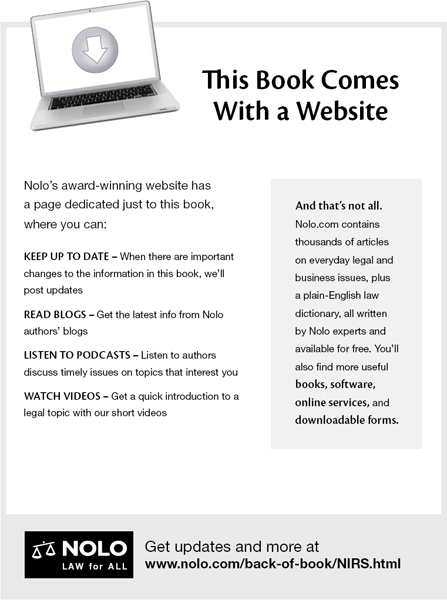

| The Trusted Name (but dont take our word for it) |
In Nolo you can trust.
THE NEW YORK TIMES
Nolo is always there in a jam as the nations premier publisher of do-it-yourself legal books.
NEWSWEEK
Nolo publications... guide people simply through the how, when, where and why of the law.
THE WASHINGTON POST
[Nolos]... material is developed by experienced attorneys who have a knack for making complicated material accessible.
LIBRARY JOURNAL
When it comes to self-help legal stuff, nobody does a better job than Nolo...
USA TODAY
The most prominent U.S. publisher of self-help legal aids.
TIME MAGAZINE
Nolo is a pioneer in both consumer and business self-help books and software.
LOS ANGELES TIMES
3rd Edition
Every Nonprofits
Tax Guide
How to Keep Your Tax-Exempt
Status & Avoid IRS Problems
Stephen Fishman, J.D.

THIRD EDITION | JANUARY 2014 |
Editor | DIANA FITZPATRICK |
Cover Design | SUSAN PUTNEY |
Book Design | TERRI HEARSH |
Proofreading | IRENE BARNARD |
Index | SONGBIRD INDEXING SERVICES |
Printing | BANG PRINTING |
ISBN: 2330-8680 (print)
ISBN: 2330-8842 (online)
ISBN: 978-1-4133-1929-3 (pbk)
ISBN: 978-1-4133-1930-9 (epub ebook)
This book covers only United States law, unless it specifically states otherwise.
Copyright 2009, 2011, and 2013 by Nolo. All rights reserved. The NOLO trademark is registered in the U.S. Patent and Trademark Office. Printed in the U.S.A.
No part of this publication may be reproduced, stored in a retrieval system, or transmitted in any form or by any means, electronic, mechanical, photocopying, recording, or otherwise without prior written permission. Reproduction prohibitions do not apply to the forms contained in this product when reproduced for personal use. For information on bulk purchases or corporate premium sales, please contact the Special Sales Department. Nolo, 950 Parker Street, Berkeley, California 94710.
Please note
We believe accurate, plain-English legal information should help you solve many of your own legal problems. But this text is not a substitute for personalized advice from a knowledgeable lawyer. If you want the help of a trained professionaland well always point out situations in which we think thats a good ideaconsult an attorney licensed to practice in your state.
Acknowledgments
Many thanks to:
Diana Fitzpatrick for her outstanding editing
Terri Hearsh for book design
About the Author
Stephen Fishman is a San Francisco-based attorney and tax expert who has been writing about the law for over 20 years. He is the author of many do-it-yourself law books, including Deduct It! Lower Your Small Business Taxes, Every Landlords Tax Deduction Guide, and Working for Yourself: Law & Taxes for Independent Contractors, Freelancers & Consultants. All of his books are published by Nolo.
He is often quoted on tax-related issues by newspapers across the country, including the Chicago Tribune, San Francisco Chronicle, and Cleveland Plain Dealer.
His website and blog are at Fishmanlawandtaxfiles.com.
Table of Contents
Your Legal Companion for Nonprofit Tax Compliance
This book is for you if you have a nonprofit that is up and running, whether its been one day or one decade. You have dealt with the IRS already because you have your tax-exempt status. Now youre wondering what else the IRS has in store for you and your nonprofit? The answer is: a lot.
Your nonprofits relationship with the IRS doesnt end when you receive your tax-exempt status. Indeed, thats only the beginning. The IRS will continue to oversee its compliance with the myriad of complex tax laws and regulations governing nonprofits. Dealing with the IRS and its rules is the price all nonprofits pay in return for the substantial tax benefits they receive.
Failure to comply with these laws can lead to dire consequencesrevocation of your tax-exempt status, or the imposition of taxes and penalties on your nonprofit, or even on your officers, directors, or employees personally. In the past, the IRS was relatively lax about monitoring and enforcing nonprofit compliance with tax rules. However, in response to widespread publicity about abuses by nonprofits and Congressional calls for better enforcement, the IRS has begun to more closely monitor nonprofits. These include more audits, requiring all nonprofits to file annual notices with the IRS, and substantially beefing up the annual information return filed by larger nonprofitsthe IRS Form 990. Nonprofits need to take ongoing compliance with IRS rules and regulations more seriously than ever before.
In this era of fewer donations and grants and reductions in nonprofit staffing, the last thing a nonprofit wants to do is pay an accountant or lawyer to deal with IRS compliance issues. Fortunately, you can handle all or most compliance tasks yourself or with minimal help. This book can help. It contains step-by-step guidance on:
how to file annual information returns with the IRS
what types of records your nonprofit is required to keep
classifying workers as employees or independent contractors and dealing with employment taxes
how to comply with the tax laws governing the use of volunteers
the deductibility of charitable contributions
when you must provide written substantiation for contributions
avoiding IRS taxes or penalties due to conflicts of interest, payment of excessive compensation, insider transactions, and other prohibited behavior
how to avoid having to pay taxes on side businesses your nonprofit conducts to earn extra income
what types of lobbying are and are not allowed, and
how to steer clear of the prohibition on political activity.
Running a nonprofit is difficult enough these days without having to worry about the IRS looking over your shoulder. Turn to this book whenever you have a question about IRS rules or nonprofit compliance issues.
 TIP
TIP
What this book is not. This book is not about how to form a nonprofit corporation or apply for IRS recognition of your nonprofits tax-exempt status. For guidance on these tasks, refer to How to Form a Nonprofit Corporation, by Anthony Mancuso (Nolo). Also, this book has been written primarily for Section 501(c)(3) organizations that qualify as public charities and it does not cover the special tax rules applicable to private foundations. Moreover, while much of the material here is applicable to nonprofits other than Section 501(c)(3) organizations, this book has not been written with such organizations in mind.
Next page
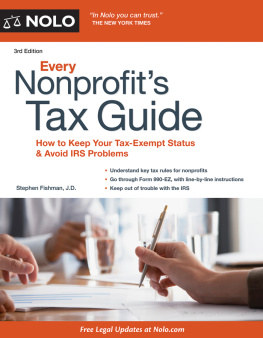
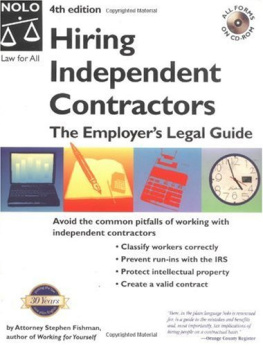

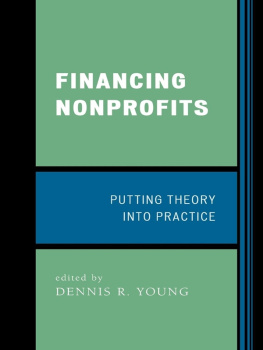
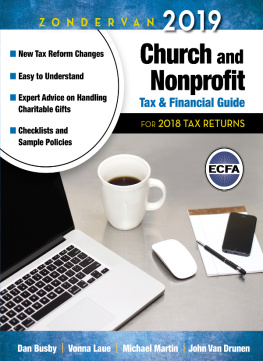
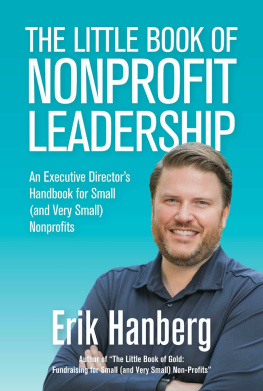
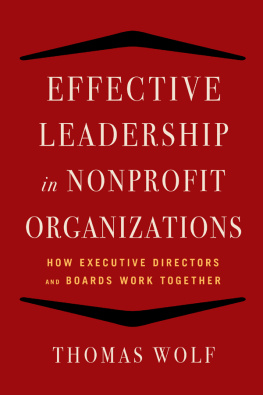




 TIP
TIP